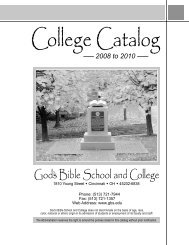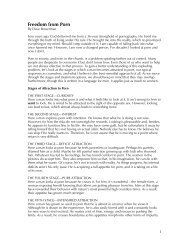revivalist PDF template - God's Bible School & College
revivalist PDF template - God's Bible School & College
revivalist PDF template - God's Bible School & College
Create successful ePaper yourself
Turn your PDF publications into a flip-book with our unique Google optimized e-Paper software.
Paul’s transitional statement, “sin shall not have dominion over<br />
you: for you are not under the law, but under grace” (6:14), introduces<br />
the first of two illustrations which stress the liberating power<br />
of God’s grace over sin.<br />
The first illustration (Romans 6:15–23) further explains what<br />
happened to believers at the moment of their union with Christ in<br />
His death to sin. When we died with Christ to sin, we were freed<br />
from the slavery of sin (6:18, 22) and voluntarily became slaves to a<br />
new master, Jesus Christ. Prior to our union with Christ, we were<br />
“slaves to sin” (6:17, 20). Now in Christ we are “slaves to righteousness”<br />
(6:18) and “slaves to God” (6:22).<br />
The believer must no longer use the members of his body as<br />
instruments of sin or unrighteousness. To do so would nullify<br />
one’s relationship with Christ, for He emphatically declared “no<br />
man can serve two masters” (Mat. 6:24; Luk. 16:13). To continue<br />
in sin would be proof positive that the professed believer was<br />
not saved. Paul asserts, “Know ye not, that to whom ye yield<br />
yourselves servants to obey, his servants ye are to whom ye obey;<br />
whether of sin unto death, or of obedience unto righteousness”<br />
(6:16) He continues, “But God be thanked, that ye were the servants<br />
of sin, but ye have obeyed from the heart that form of doctrine<br />
which was delivered you. Being then made free from sin, ye<br />
became the servants of righteousness” (6:17–18). Again and<br />
again Paul stresses that the believer is set free from sin and must<br />
not return to its slavery. He emphatically declares, “For when ye<br />
were the servants of sin, ye were free from righteousness. What<br />
fruit had ye then in those things whereof ye are now ashamed<br />
for the end of those things is death. But now being made free<br />
from sin, and become servants to God, ye have your fruit unto<br />
holiness, and the end everlasting life. For the wages of sin is<br />
death; but the gift of God is eternal life through Jesus Christ our<br />
Lord” (6:20–23).<br />
One modern application should become immediately apparent.<br />
Paul would deny the possibility of a Christian continuing in sin. The<br />
Christian is not a saved sinner! Through the grace of God he has<br />
become an ex-sinner. The <strong>Bible</strong> speaks of the Christian as a transformed<br />
saint—a holy person. The term “holy one” or “saint” is used<br />
over 60 times in the New Testament to identify the true believer.<br />
Paul never writes to the “saved sinners” at Corinth or Rome, or any<br />
other place; it is always to the “saints.” The reason for this is because<br />
the fruit of a Christian’s life is holiness (not sin!), and the end everlasting<br />
life (Rom. 6:22).<br />
The second illustration, Romans 7:1–6, is actually an explanation<br />
of what Paul meant when he said, “Sin shall not have dominion<br />
over you: for you are not under the law, but under grace” (Rom.<br />
6:14). It is also an answer to his rhetorical question, “What then<br />
Shall we sin, because we are not under the law, but under grace”<br />
(Rom. 6:15).<br />
Paul responds to his own question with an emphatic, “God forbid,”<br />
which is equivalent to a modern day “absolutely not!” The<br />
believer’s relationship to the law is analogous to the relationship a<br />
married person has to his or her dead spouse. The death of a spouse<br />
frees the living partner from the legal bonds of marriage. In the case<br />
of the believer and the law, it is the believer who has died. Just as a<br />
believer “died to sin” (6:2) and so is “set free from sin” (6:18, 22), so<br />
he also died to the Law and is separated and set free from it (6:14;<br />
cf. Gal. 2:19). This separation was accomplished “by the body of<br />
Christ” (Rom. 7:4), that is, through Christ’s death on the cross. As a<br />
result, the believer now is joined to the Lord Jesus Christ in order<br />
that he might bear fruit to God (Rom. 7:5).<br />
What are the implications of the fact that believers are not under<br />
the law, but under grace We know that Paul did not mean that the<br />
law as a revelation of God’s character and desires was abolished for<br />
Christians. In Romans 3:31 he said, “Do we then nullify the law<br />
through faith May it never be! On the contrary, we establish the<br />
law.” Further, Paul taught that the law still has much to say to New<br />
Testament Christians if they use it properly (1 Tim. 1:8). And because<br />
the law was given by inspiration of God, it is still profitable for doctrinal<br />
teaching (2 Tim. 3:16–17) in this New Testament dispensation.<br />
Although Paul tells us that Jesus brought to an end the Old Testament<br />
law as a binding covenant when He inaugurated His new covenant<br />
(Rom. 10:4), he did not nullify all of the Old Testament law, for the<br />
Hebrew writer said that in the New Covenant Jesus places “the law”<br />
in our hearts and minds (Heb. 8:10; Jer. 31:33). And we know that<br />
2 3

















